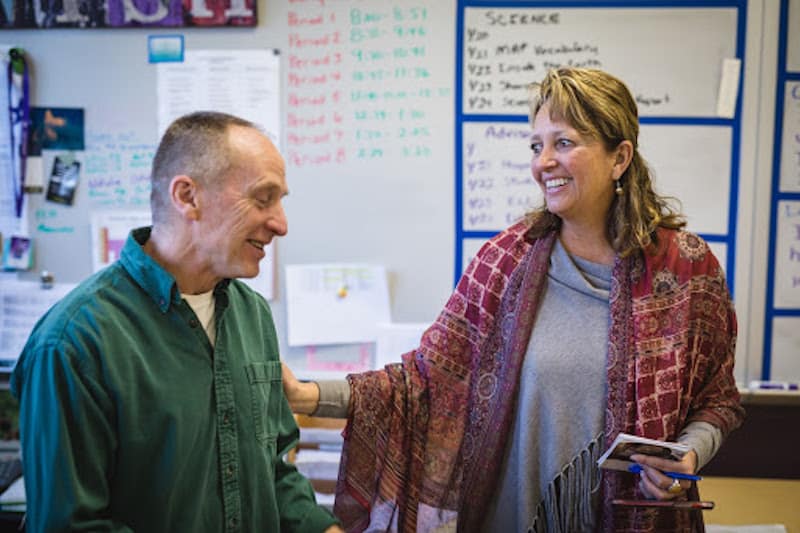Learning Coach Academy: Supporting the Role of Parents or Guardians in Remote Learning

By: Heather Hiebsch and Cheryl Fenlason
This spring, millions of parents and guardians were forced into a role that most never expected and few were prepared for – acting as “teacher” to students learning from home. For many, it was a high-stress and low reward experience.
It looks like many students will again – at least in part – be learning remotely in the coming school year. So how can we better prepare parents or guardians to support students?
A simple answer: let’s get them on our team and develop “Learning Coaches” who can help kids adapt – even thrive – in this new educational landscape.
What is a Learning Coach?
A Learning Coach (LC) is an adult who actively supports a student’s learning away from school – it can be a parent, guardian, grandparent, aunt or uncle, coach, neighbor, etc. For younger kids, it is usually the person with whom the child spends most of their day outside of school.
Is the LC the Teacher?
No – these are distinctly different roles.
The easiest way to think about it is that the teacher plans and delivers lessons, while the LC helps ensure lessons are completed and questions are communicated. An LC’s role is to check in with kids about deadlines, communication with teachers, time management, and organization — essentially they act as a guide and accountability partner to help kids stay focused and on track.
While these roles are different, it is most powerful when everyone is on the same team. Think of the holistic expertise now “in the room” when teachers and LCs join forces – you have content and pedagogy experts for deep learning and someone with expertise on the child’s life outside of school for deep relevancy.
How involved will the LC need to be?
Be realistic when setting expectations for the LC’s involvement.
For older students, it might not require much time. For some, it may be fine for the LC to do a daily (or even weekly) check-in on schedule, grades, and to model communications with teachers and peers.
For younger students, there will be a heavier lift. Obviously, we cannot expect a 5-year-old to attentively attend a Zoom meeting from 8:00 am – 3:00 pm! Instead, the teacher can send a weekly plan to the LC with lessons and activities to be completed. Great online teachers will make these as independent as possible, even for primary littles!
The LC will then report outcomes back to the teacher, so the teacher can evaluate, plan the next lessons, or provide intervention if necessary.
How can schools set LCs up for success?
First, make sure you are communicating clearly, efficiently, and at regular intervals.
Do not overload LCs with multiple emails, videos, websites, links, and materials. Have a single go-to webpage and make sure your LCs know when they are going to hear from you. Post the learning plan and activities for the week, and share office hours stating when you are available for questions or challenges. This allows the LCs to plan the student’s learning schedules at their convenience.
Next, treat LCs as your professional partners.
Remember, their success is your success… which is ultimately the success of the student. As partners in education, why wouldn’t we provide LCs with opportunities for input and Professional Development?
So…how do you facilitate Professional Development (PD) for LCs?
LCs are uniquely qualified to be a partner in a child’s learning – filling their toolbox contributes to the success of the student and the LC, and builds their confidence as a learning partner.
So, what next?
Develop a “Learning Coach Academy (LCA)” – or a PD program designed for LCs. Some tips:
- Establish the why: Make sure to have clear goals and outcomes. Examples include: developing strong relationships between teachers and LCs, developing practical ways to support learning at home, and/or providing pedagogical knowledge that will strengthen support of learning.
- Consider LCs’ needs: Both in scheduling workshops or learning opportunities and understanding their support needs. Survey your teachers and LCs – LCs will know what they need and teachers know what will make them stronger partners.
- Get frequent feedback: Solicit feedback throughout the year. Make a plan and then get ready to adjust it based on what LCs say they need.
- Schedule opportunities for LCs to support each other: This is the LCs’ professional network. LCs can often provide empathetic support and practical suggestions to each other because they are experiencing many of the same challenges.
Summary and Lessons Learned
- Don’t assume it is a one-way street.
While teachers are the experts in their content area, LCs are the experts on their child. Success comes from establishing a two way street of learning.
- Don’t separate community-building from training.
The best LCA sessions are a mixture of coffee talk, sharing what’s working and what’s not, and a formal professional training topic. By combining social and professional learning, attendance and engagement will be higher.
- DO treat your LCAs as a one-year PD Plan. Include:
- Pedagogy – student engagement, use of rubrics, data-driven instruction
- Academic Content – use of adopted curriculum, content area standards, objectives for writing samples
- Social-Emotional Learning Content – resources for an organization, time management, stress management, and building positive relationships
- PLCs – professional learning is more powerful as a collective – have LCs formally mentor others, set goals, share successes and challenges.
Bottom line: The larger the support network our kids have, the more successful they will be in school—and this holds particularly true now. Though we are collectively facing a lot of challenges, there are also opportunities to make things better for our schools and our kids in the long-term.
For more, see:
- Engaging Families During Distance Learning
- Ron Berger on a Teamwork Approach to School Culture
- How Schools Can Help Cultivate Learner Identity and Agency
TeachUNITED is a global 501c3 non-profit supporting schools and teachers adapting to personalized learning through a grant-funded coaching program. Heather Hiebsch (@heather_hiebsch) is the Co-Founder and Executive Director and former K-12 Principal. For more information, contact [email protected]. Also contributing, Cheryl Fenalson is the Principal of the Poudre School District Global Academy in Fort Collins, CO.
Stay in-the-know with innovations in learning by signing up for the weekly Smart Update.





0 Comments
Leave a Comment
Your email address will not be published. All fields are required.